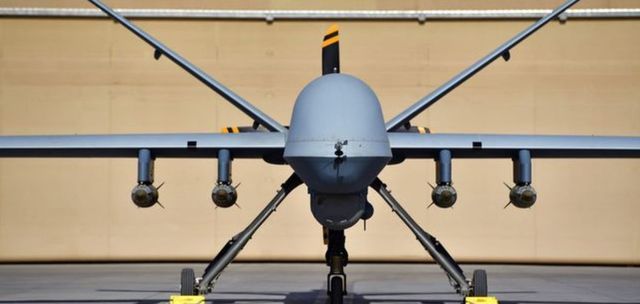
Pakistani officials have privately begun confirming a secret visit to Islamabad of CIA Director William Burns and are suggesting that he was firmly told that Pakistan would not host the spy agency’s drone bases on its territory, according to the daily Dawn.
This comes after New York Times in an article published on June 6 claimed that Mr Burns had travelled to Pakistan for meetings with Army Chief Gen Qamar Javed Bajwa and ISI Director General Lt Gen Faiz Hamid to explore the possibility of counterterrorism cooperation between the two sides.
The Central Intelligence Agency is said to be looking for bases around Afghanistan from where it could gather intelligence on Afghanistan and execute counterterrorism strikes after the completion of troop withdrawal from there, the Dawn said.
The purpose of quietly sharing of information by the Pakistani officials with select journalists at this stage apparently looked to dispel the impression that the two sides were engaged in negotiations on hosting of US drone bases by Pakistan.
New York Times article had at one point said that American officials believed that Pakistan wanted to allow the US to access a base. But, it indicated that Pakistani officials were setting very stringent conditions.
“In discussions between American and Pakistani officials, the Pakistanis have demanded a variety of restrictions in exchange for the use of a base in the country, and they have effectively required that they sign off on any targets that either the CIA or the military would want to hit inside Afghanistan, according to three Americans familiar with the discussions,” as per the NYT article.
Dawn quoted officials as saying that the CIA chief wanted to meet Prime Minister Imran Khan, but was plainly told that only counterpart meeting between heads of government of the two countries was possible.
The officials further said the CIA chief was categorically conveyed that no US operation would be allowed from Pakistani territory. They rather suggested to have asked the Americans to hand over the drones to them for carrying out the strikes against terrorist targets.
Three factors
There are three factors that will account for Pakistan’s perseverance and inflexibility on extending basing rights to the United States, according to Dr. Syed Ali Zia Jaffery of the Diplomat.
First, the consistency with which Pakistan’s Prime Minister Imran Khan has vociferously opposed his country’s past dealings with Washington has left little room for his government to acquiesce to U.S. requests. Before coming into power, Khan was a staunch critic of U.S. drone strikes in Pakistan, even launching a campaign against them.
Second, Pakistan aiding the United States in its efforts to keep an eye on the Taliban would likely vitiate the country’s ties with the powerful Afghan group. Pakistan can ill-afford to attenuate its relationship with the Taliban because it is becoming abundantly clear that they are the most dominant player in the Afghan political landscape.
Having already warned Afghanistan’s neighbors against making the historic mistake of allowing the U.S. to operate military bases, the Taliban would certainly not welcome Pakistan taking such a step. They could accuse Pakistan of wilting under U.S. pressure.
Third, Pakistan allowing the U.S. to use military bases for carrying out combat missions will likely be a cause of concern for two of Pakistan’s neighbors: China and Iran. That both countries are adversaries of the United States is all the more troubling. Washington has termed Beijing the biggest threat to U.S. national security.
Coupled with the U.S. aversion to the China-Pakistan Economic Corridor (CPEC), this mean that should Pakistan allow U.S. forces to operate out of its territory, Washington would almost certainly use that advantage to keep tabs on CPEC, which is expected to expand and gain momentum. Both Pakistan and China would not like to see the U.S. physically lurking around CPEC hotspots, including the critical Gwadar port.
Other than China, Iran will also be directly affected if Pakistan were to let the U.S. ensconce itself in close proximity to that country, Dr. Syed Ali Zia Jaffery, a strategic affairs and foreign policy analyst, concluded.
Airspace access
Pakistan has allowed the US military to use its airspace and given ground access so that it can support its presence in Afghanistan, a Pentagon official said last month.
David F. Helvey, Assistant Secretary of Defense for Indo-Pacific Affairs, told the US Senate Armed Services Committee last month that the United States would continue its conversation with Pakistan because it had a critical role in restoring peace to Afghanistan.
The official was replying to a question from Senator Joe Manchin, a West Virginia Democrat, who asked him to “outline your assessment of Pakistan, and particularly of Pakistani intelligence agencies, and the role you expect them to play in our future”.
“Pakistan has played an important role in Afghanistan. They supported the Afghan peace process. Pakistan also has allowed us to have over-flight and access to be able to support our military presence in Afghanistan,” Mr Helvey said.
“We will continue our conversations with Pakistan because their support and contribution to the future of Afghanistan, to future peace in Afghanistan, is going to be critical,” he added.
Diplomatic sources in Washington told Dawn that Pakistan had always allowed over-flights and ground access to the US to facilitate its military presence in Afghanistan and would continue to do so.
Abdus Sattar Ghazali is the Chief Editor of the Journal of America (www.journalofmaerica.net) email: [email protected]
GET COUNTERCURRENTS DAILY NEWSLETTER STRAIGHT TO YOUR INBOX
Related posts:
Related posts:
Views: 0
 RSS Feed
RSS Feed

















 June 13th, 2021
June 13th, 2021  Awake Goy
Awake Goy  Posted in
Posted in  Tags:
Tags: 
















